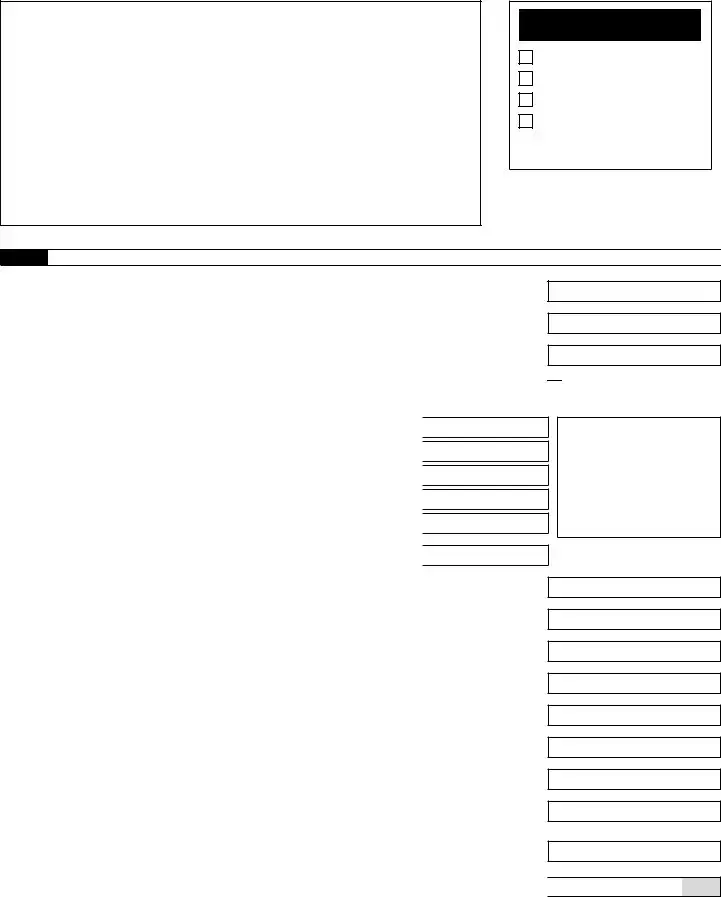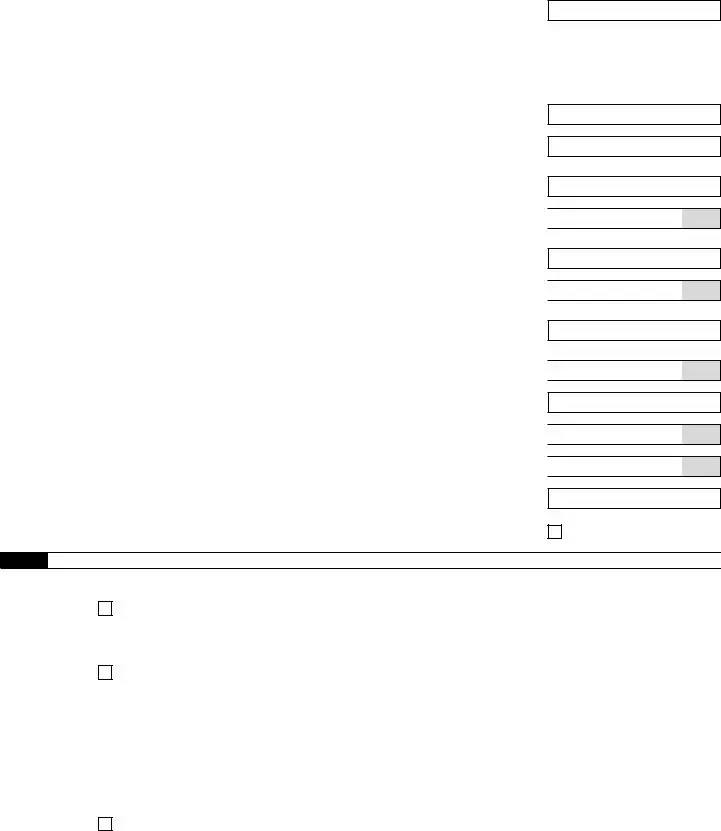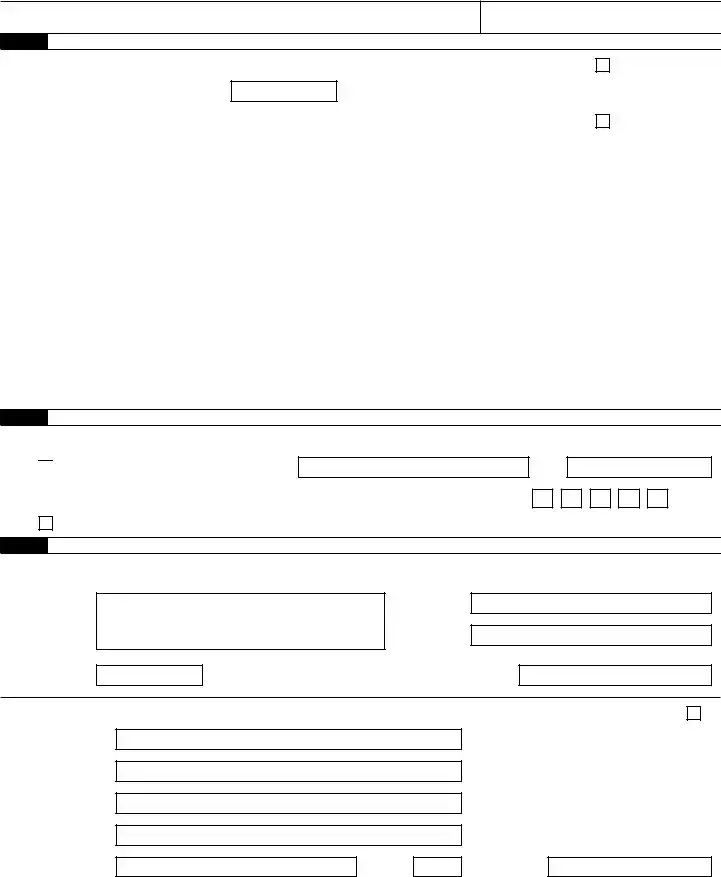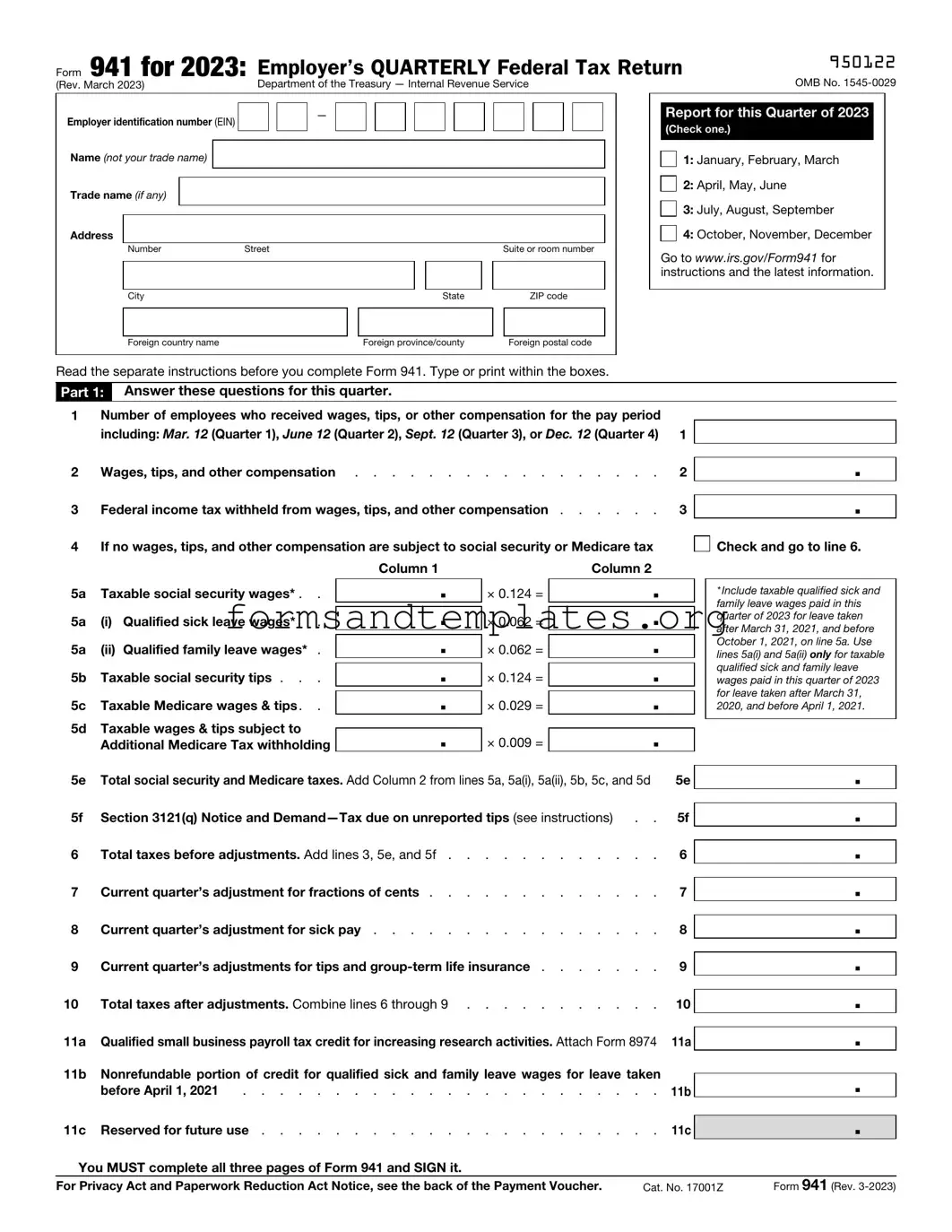Printable IRS 941 Template
The IRS Form 941 is a crucial document for employers, serving as a quarterly report that details the wages paid to employees and the taxes withheld from their paychecks. This form not only helps businesses stay compliant with federal tax laws but also plays a significant role in reporting the employer's share of Social Security and Medicare taxes. Each quarter, employers must accurately calculate and report the total taxable wages, tips, and other compensation, as well as the amounts withheld for federal income tax. Additionally, Form 941 requires employers to disclose any adjustments for prior quarters, ensuring that the IRS has a clear picture of the company's payroll tax obligations. Timely submission of this form is essential to avoid penalties and interest, making it a key component of effective payroll management. Understanding the intricacies of Form 941 can empower employers to navigate their responsibilities with confidence, ultimately supporting the financial health of their business.
Common mistakes
-
Not including the correct Employer Identification Number (EIN). This number is essential for the IRS to identify the business.
-
Failing to report all wages paid. It's important to include all taxable wages to avoid discrepancies.
-
Incorrectly calculating the tax liability. This can lead to underpayment or overpayment of taxes.
-
Omitting or incorrectly entering the number of employees. Accurate reporting helps in determining tax obligations.
-
Not signing the form. A signature is required to validate the submission.
-
Using outdated forms. Always ensure you are using the most current version of IRS Form 941.
-
Not checking for math errors. Simple arithmetic mistakes can lead to significant issues.
-
Failing to file on time. Late submissions can result in penalties and interest.
-
Not keeping a copy of the submitted form. Retaining a copy is crucial for future reference and potential audits.
Find Common Documents
Dd Form 2870 - The DD 2870 helps organize dental care requests for quicker responses.
As you prepare to fill out the California Homeschool Letter of Intent, it's important to have all necessary resources at your fingertips, ensuring you meet all requirements effectively. For additional assistance, visit California Templates to find helpful tools that can guide you through the process of completing this essential document.
Cg2010 and Cg2037 - Being informed about your coverage options empowers you in contractual dealings.
Key takeaways
The IRS Form 941 is a critical document for employers in the United States. It serves as a quarterly report for payroll taxes. Understanding how to fill it out correctly can save time, money, and headaches down the line. Here are some key takeaways to keep in mind:
- Filing Frequency: Form 941 must be filed quarterly, meaning you’ll need to submit it four times a year.
- Due Dates: The due date for filing is typically the last day of the month following the end of each quarter. For example, the first quarter ends in March, so the form is due by April 30.
- Employee Information: Ensure that you accurately report the number of employees and the wages paid during the quarter. This information is crucial for calculating tax liabilities.
- Tax Calculations: You’ll need to calculate the amount of federal income tax withheld and the total payroll taxes owed. Double-check your calculations to avoid penalties.
- Adjustments: If you need to make adjustments for prior quarters, there are specific lines on the form to indicate these changes. Be clear and precise to avoid confusion.
- Signature Requirement: Don’t forget to sign and date the form. An unsigned form is considered incomplete and may lead to delays or penalties.
- Electronic Filing: Consider filing electronically. This method can simplify the process and provide immediate confirmation of receipt.
- Record Keeping: Maintain copies of your filed forms and any supporting documentation. This practice is essential for future reference and in case of an audit.
By keeping these takeaways in mind, you can navigate the complexities of Form 941 with greater ease. Understanding each component helps ensure compliance and can contribute to the smooth operation of your business.
IRS 941 Example

Form 941 for 2023: |
Employer’s QUARTERLY Federal Tax Return |
950122 |
|
|
|
(Rev. March 2023) |
Department of the Treasury — Internal Revenue Service |
OMB No. |
Employer identification number (EIN) |
|
|
|
— |
|
|
|
|
|
|
|
|
|
|
|
|
|
|||
|
|
|
|
|
|
|
|
|
|
|
|
|
|
|
|
|
||||
|
|
|
|
|
|
|
|
|
|
|
|
|
|
|
|
|
|
|
|
|
|
|
|
|
|
|
|
|
|
|
|
|
|
|
|
|
|
|
|
|
|
Name (not your trade name) |
|
|
|
|
|
|
|
|
|
|
|
|
|
|
|
|
|
|
||
|
|
|
|
|
|
|
|
|
|
|
|
|
|
|
|
|
|
|
|
|
|
|
|
|
|
|
|
|
|
|
|
|
|
|
|
|
|
|
|
|
|
Trade name (if any) |
|
|
|
|
|
|
|
|
|
|
|
|
|
|
|
|
|
|
||
Address |
|
|
|
|
|
|
|
|
|
|
|
|
|
|
|
|
|
|
|
|
|
|
|
|
|
|
|
|
|
|
|
|
|
|
|
|
|
|
|||
|
|
|
|
|
|
|
|
|
|
|
|
|
|
|
|
|
|
|||
Number |
Street |
|
|
|
|
|
Suite or room number |
|
|
|
|
|
|
|
|
|
|
|
|
|
|
|
|
|
|
|
City |
|
|
|
|
State |
|
|
ZIP code |
|
|
|
|
|
|
|
||
|
|
|
|
|
|
|
||
Foreign country name |
|
|
Foreign province/county |
|
|
Foreign postal code |
||
Report for this Quarter of 2023
(Check one.)
1: January, February, March
2: April, May, June
3: July, August, September
4: October, November, December
Go to www.irs.gov/Form941 for instructions and the latest information.
Read the separate instructions before you complete Form 941. Type or print within the boxes.
Part 1: Answer these questions for this quarter.
1 |
Number of employees who received wages, tips, or other compensation for the pay period |
|
including: Mar. 12 (Quarter 1), June 12 (Quarter 2), Sept. 12 (Quarter 3), or Dec. 12 (Quarter 4) 1 |
2 |
Wages, tips, and other compensation |
. |
2 |
|||||
3 |
Federal income tax withheld from wages, tips, and other compensation |
. |
3 |
|||||
4 |
If no wages, tips, and other compensation are subject to social security or Medicare tax |
|
||||||
|
|
Column 1 |
|
Column 2. |
|
|||
5a |
Taxable social security wages* . . |
. |
× 0.124 = |
|
||||
|
|
|
|
|
|
. |
|
|
5a |
(i) |
Qualified sick leave wages* . |
. |
× 0.062 = |
|
|
||
|
|
|
|
|
|
. |
|
|
5a |
(ii) |
Qualified family leave wages* . |
. |
× 0.062 = |
|
|
||
|
|
|
|
|
. |
|
||
5b |
Taxable social security tips . . . |
. |
× 0.124 = |
|
|
|||
|
|
|
|
|
. |
|
||
5c |
Taxable Medicare wages & tips. . |
. |
× 0.029 = |
|
|
|||
5d |
Taxable wages & tips subject to |
|
|
|
|
|
||
. |
× 0.009 = |
|
. |
|
||||
|
Additional Medicare Tax withholding |
|
|
|||||
5e |
Total social security and Medicare taxes. Add Column 2 from lines 5a, 5a(i), 5a(ii), 5b, 5c, and 5d |
|
5e |
|||||
5f |
Section 3121(q) Notice and |
. |
5f |
|||||
6 |
Total taxes before adjustments. Add lines 3, 5e, and 5f |
. |
6 |
|||||
7 |
Current quarter’s adjustment for fractions of cents |
. |
7 |
|||||
8 |
Current quarter’s adjustment for sick pay |
. |
8 |
|||||
9 |
Current quarter’s adjustments for tips and |
. |
9 |
|||||
10 |
Total taxes after adjustments. Combine lines 6 through 9 |
. |
10 |
|||||
11a |
Qualified small business payroll tax credit for increasing research activities. Attach Form 8974 |
11a |
||||||
11b |
Nonrefundable portion of credit for qualified sick and family leave wages for leave taken |
|
||||||
|
before April 1, 2021 |
. . . . . . . . . . . . . . . . . . . . . . |
. |
11b |
||||
.
.

 Check and go to line 6.
Check and go to line 6.
*Include taxable qualified sick and family leave wages paid in this quarter of 2023 for leave taken after March 31, 2021, and before October 1, 2021, on line 5a. Use lines 5a(i) and 5a(ii) only for taxable qualified sick and family leave wages paid in this quarter of 2023 for leave taken after March 31, 2020, and before April 1, 2021.
.
.
.
.
.
.
.
.
.
11c Reserved for future use . . . . . . . . . . . . . . . . . . . . . . 11c 
.
You MUST complete all three pages of Form 941 and SIGN it.
For Privacy Act and Paperwork Reduction Act Notice, see the back of the Payment Voucher. |
Cat. No. 17001Z |
Form 941 (Rev. |

951222
Name (not your trade name) |
Employer identification number (EIN) |
|
|
|
– |
Part 1: |
Answer these questions for this quarter. (continued) |
|
11d Nonrefundable portion of credit for qualified sick and family leave wages for leave taken after March 31, 2021, and before October 1, 2021 . . . . . . . . . . . . . 11d
.
|
|
|
|
|
11e |
Reserved for future use |
. . . . . . . . . 11e |
. |
|
11f |
Reserved for future use |
|
|
|
|
|
|
||
11g |
Total nonrefundable credits. Add lines 11a, 11b, and 11d |
11g |
12 |
Total taxes after adjustments and nonrefundable credits. Subtract line 11g from line 10 . |
12 |
.
.
13a |
Total deposits for this quarter, including overpayment applied from a prior quarter and |
|
|
overpayments applied from Form |
13a |
13b |
Reserved for future use |
13b |
.
 .
.
13c Refundable portion of credit for qualified sick and family leave wages for leave taken |
|
before April 1, 2021 |
13c |
13d Reserved for future use |
13d |
.
 .
.
13e Refundable portion of credit for qualified sick and family leave wages for leave taken after March 31, 2021, and before October 1, 2021 . . . . . . . . . . . . . . 13e
.
13f |
Reserved for future use |
13f |
13g |
Total deposits and refundable credits. Add lines 13a, 13c, and 13e |
13g |
13h |
Reserved for future use |
13h |
13i |
Reserved for future use |
13i |
14Balance due. If line 12 is more than line 13g, enter the difference and see instructions . . . 14
|
|
|
|
15 |
Overpayment. If line 13g is more than line 12, enter the difference |
. |
Check one: |
 .
.
.
 .
.
 .
.
.
Apply to next return. |
|
Send a refund. |
Part 2: Tell us about your deposit schedule and tax liability for this quarter.
If you’re unsure about whether you’re a monthly schedule depositor or a semiweekly schedule depositor, see section 11 of Pub. 15.
16 Check one:
Line 12 on this return is less than $2,500 or line 12 on the return for the prior quarter was less than $2,500, and you didn’t incur a $100,000
You were a monthly schedule depositor for the entire quarter. Enter your tax liability for each month and total
liability for the quarter, then go to Part 3.
|
|
|
Tax liability: Month 1 |
. |
|
|
|
|
Month 2 |
. |
|
|
|
|
Month 3 |
. |
|
|
|
|
Total liability for quarter |
. |
Total must equal line 12. |
You were a semiweekly schedule depositor for any part of this quarter. Complete Schedule B (Form 941),
Report of Tax Liability for Semiweekly Schedule Depositors, and attach it to Form 941. Go to Part 3.
You MUST complete all three pages of Form 941 and SIGN it.
Page 2 |
Form 941 (Rev. |

950922
Name (not your trade name)
Employer identification number (EIN)
–
Part 3: Tell us about your business. If a question does NOT apply to your business, leave it blank.
17 If your business has closed or you stopped paying wages . . . . . . . . . . . . . . .
Check here, and
enter the final date you paid wages
/ /
; also attach a statement to your return. See instructions.
18 If you’re a seasonal employer and you don’t have to file a return for every quarter of the year . . .
Check here.
19Qualified health plan expenses allocable to qualified sick leave wages for leave taken before April 1, 2021
20Qualified health plan expenses allocable to qualified family leave wages for leave taken before April 1, 2021
21 |
Reserved for future use |
22 |
Reserved for future use |
23Qualified sick leave wages for leave taken after March 31, 2021, and before October 1, 2021
24Qualified health plan expenses allocable to qualified sick leave wages reported on line 23
25Amounts under certain collectively bargained agreements allocable to qualified sick
leave wages reported on line 23 . . . . . . . . . . . . . . . . . . .
26Qualified family leave wages for leave taken after March 31, 2021, and before October 1, 2021
27Qualified health plan expenses allocable to qualified family leave wages reported on line 26
28Amounts under certain collectively bargained agreements allocable to qualified family leave wages reported on line 26 . . . . . . . . . . . . . . . . . . .
|
|
19 |
. |
|
|
20 |
. |
|
|
21 |
. |
|
|
22 |
. |
|
|
23 |
. |
|
|
24 |
. |
|
|
25 |
. |
|
|
26 |
. |
|
|
27 |
. |
|
|
28 |
. |
Part 4: May we speak with your
Do you want to allow an employee, a paid tax preparer, or another person to discuss this return with the IRS? See the instructions
for details.

 Yes. Designee’s name and phone number
Yes. Designee’s name and phone number
Select a
No.
Part 5: Sign here. You MUST complete all three pages of Form 941 and SIGN it.
Under penalties of perjury, I declare that I have examined this return, including accompanying schedules and statements, and to the best of my knowledge and belief, it is true, correct, and complete. Declaration of preparer (other than taxpayer) is based on all information of which preparer has any knowledge.
Sign your name here
Date
/ /
Print your name here
Print your title here
Best daytime phone
Paid Preparer Use Only
Preparer’s name
Preparer’s signature
Firm’s name (or yours if
Address
City
State
Check if you’re
PTIN |
|
|
|
|
|
|
|
Date |
/ |
/ |
|
EIN |
|
|
|
|
|
|
|
Phone |
|
|
|
|
|
|
ZIP code
Page 3 |
Form 941 (Rev. |
951020
This page intentionally left blank

Form
Purpose of Form
Complete Form
Making Payments With Form 941
To avoid a penalty, make your payment with Form 941 only if:
•Your total taxes after adjustments and nonrefundable credits (Form 941, line 12) for either the current quarter or the preceding quarter are less than $2,500, you didn’t incur a $100,000
•You’re a monthly schedule depositor making a payment in accordance with the Accuracy of Deposits Rule. See section 11 of Pub. 15 for details. In this case, the amount of your payment may be $2,500 or more.
Otherwise, you must make deposits by electronic funds transfer. See section 11 of Pub. 15 for deposit instructions. Don’t use Form
▲! Use Form
CAUTION Form 941 that should’ve been deposited, you may be subject to a penalty. See Deposit Penalties in section 11 of Pub. 15.
Specific Instructions
Box
Box
Box
Box
•Enclose your check or money order made payable to “United States Treasury.” Be sure to enter your
EIN, “Form 941,” and the tax period (“1st Quarter 2023,” “2nd Quarter 2023,” “3rd Quarter 2023,” or “4th Quarter 2023”) on your check or money order. Don’t send cash.
Don’t staple Form
•Detach Form
and Form 941 to the address in the Instructions for Form 941.
Note: You must also complete the entity information above Part 1 on Form 941.
Detach Here and Mail With Your Payment and Form 941.
Form |
|
|
|
|
Payment Voucher |
|
OMB No. |
||||
|
|
|
|
||||||||
|
|
|
|
|
|
|
|
|
|
||
|
Department of the Treasury |
|
|
Don’t staple this voucher or your payment to Form 941. |
|
2023 |
|||||
|
Internal Revenue Service |
|
|
|
|||||||
|
1 Enter your employer identification |
|
2 |
|
Dollars |
|
|
Cents |
|||
|
|
number (EIN). |
|
|
Enter the amount of your payment. |
|
|
|
|
||
|
|
|
|
|
|
|
|
|
|
||
|
|
– |
|
|
Make your check or money order payable to “United States Treasury.” |
|
|
|
|||
3 |
Tax Period |
|
4 Enter your business name (individual name if sole proprietor). |
|
|
||||||
|
|
|
|
|
|
|
|
|
|
|
|
|
|
1st |
|
3rd |
|
|
|
|
|
|
|
|
|
|
|
|
|
|
|
|
|||
|
|
Quarter |
|
Quarter |
|
Enter your address. |
|
|
|||
|
|
|
|
|
|
|
|||||
|
|
2nd |
|
4th |
|
|
|||||
|
|
|
|
Enter your city, state, and ZIP code; or your city, foreign country name, foreign province/county, and foreign postal code. |
|||||||
|
|
Quarter |
|
Quarter |
|
|
|
|
|
|
|
|
|
|
|
|
|
|
|
|
|
|
|

Form 941 (Rev.
Privacy Act and Paperwork Reduction Act Notice. We ask for the information on Form 941 to carry out the Internal Revenue laws of the United States. We need it to figure and collect the right amount of tax. Subtitle C, Employment Taxes, of the Internal Revenue Code imposes employment taxes on wages and provides for income tax withholding. Form 941 is used to determine the amount of taxes that you owe. Section 6011 requires you to provide the requested information if the tax is applicable to you. Section 6109 requires you to provide your identification number. If you fail to provide this information in a timely manner, or provide false or fraudulent information, you may be subject to penalties.
You’re not required to provide the information requested on a form that is subject to the Paperwork Reduction Act unless the form displays a valid OMB control number. Books and records relating to a form or its instructions must be retained as long as their contents may become material in the administration of any Internal Revenue law.
Generally, tax returns and return information are confidential, as required by section 6103. However, section 6103 allows or requires the IRS to disclose or give the information shown on your tax return to others as described in the Code. For example, we may disclose your tax information to the Department of
Justice for civil and criminal litigation, and to cities, states, the District of Columbia, and U.S. commonwealths and possessions for use in administering their tax laws. We may also disclose this information to other countries under a tax treaty, to federal and state agencies to enforce federal nontax criminal laws, or to federal law enforcement and intelligence agencies to combat terrorism.
The time needed to complete and file Form 941 will vary depending on individual circumstances. The estimated average time is:
Recordkeeping . . . . . . . . . . 22 hr., 28 min.
Learning about the law or the form . . |
. . 53 min. |
Preparing, copying, assembling, and |
|
sending the form to the IRS |
1 hr., 18 min. |
If you have comments concerning the accuracy of these time estimates or suggestions for making Form 941 simpler, we would be happy to hear from you. You can send us comments from www.irs.gov/FormComments. Or you can send your comments to Internal Revenue Service, Tax Forms and Publications Division, 1111 Constitution Ave. NW,
Understanding IRS 941
What is the IRS Form 941?
IRS Form 941, officially known as the Employer's Quarterly Federal Tax Return, is a form used by employers to report income taxes, Social Security tax, and Medicare tax withheld from employee wages. Employers must file this form quarterly to report their payroll tax liabilities and ensure compliance with federal tax regulations.
Who needs to file Form 941?
Any employer who pays wages to employees must file Form 941. This includes:
- Businesses with employees
- Non-profit organizations
- Federal, state, and local governments
If an employer has no wages to report for a quarter, they may still need to file a Form 941, indicating that no wages were paid.
When is Form 941 due?
Form 941 is due on the last day of the month following the end of each quarter. The due dates are as follows:
- First Quarter (January - March): Due April 30
- Second Quarter (April - June): Due July 31
- Third Quarter (July - September): Due October 31
- Fourth Quarter (October - December): Due January 31 of the following year
Employers should file on time to avoid penalties and interest on any unpaid taxes.
What information is required on Form 941?
Form 941 requires several key pieces of information, including:
- Employer identification information, such as the Employer Identification Number (EIN)
- Total wages paid to employees
- Federal income tax withheld
- Social Security and Medicare taxes
- Any adjustments for tips or group-term life insurance
Accurate reporting is essential to ensure compliance and avoid issues with the IRS.
What happens if Form 941 is not filed?
Failure to file Form 941 on time can lead to various consequences, including:
- Penalties for late filing
- Interest on unpaid taxes
- Increased scrutiny from the IRS
Employers are encouraged to file on time and pay any taxes owed to avoid these penalties.
Can Form 941 be amended?
Yes, Form 941 can be amended if an employer discovers errors or omissions after filing. To amend a previously filed Form 941, employers should complete Form 941-X, Adjusted Employer's Quarterly Federal Tax Return or Claim for Refund. This form allows for corrections to be made and any necessary adjustments to taxes owed or refunds requested.
How to Use IRS 941
Once you have gathered all necessary information, you can proceed to fill out the IRS Form 941. This form is essential for reporting your payroll taxes, and accuracy is crucial. It’s important to ensure that all information is correct to avoid potential penalties or issues with the IRS.
- Start by downloading the IRS Form 941 from the official IRS website or obtain a physical copy.
- Fill in your business name and address in the designated sections at the top of the form.
- Provide your Employer Identification Number (EIN) in the space provided. This is a unique number assigned to your business by the IRS.
- Indicate the quarter for which you are filing the form by checking the appropriate box.
- In Part 1, report the number of employees who received wages during the quarter.
- Next, calculate and enter the total wages, tips, and other compensation paid to employees during the quarter.
- Determine the total taxes withheld from employee wages and enter this amount in the designated field.
- Complete the section for any adjustments that may apply, including any corrections from previous quarters.
- In Part 2, report any credits you are claiming for the quarter, such as the Employee Retention Credit.
- Proceed to Part 3, where you will sign and date the form. This certifies that all information provided is accurate and complete.
- Finally, review the entire form for any errors or omissions before submitting it to the IRS. You can file it electronically or send it by mail, depending on your preference.
After completing the form, ensure you keep a copy for your records. Timely filing is essential to maintain compliance with IRS regulations.
